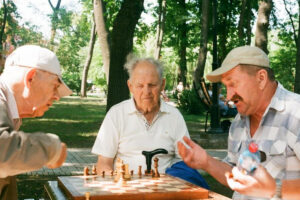Exploring Social Connections’ Role in Elderly Mental Health
Are you ready to embark on a journey that explores the profound impact of social connections on older people’s mental health?
Join us as we explore this crucial topic, uncovering the power of social engagement and the benefits of strong relationships. We will also explore how social support can enhance mental wellness and the strategies we can employ to address the pervasive issue of loneliness among older adults. Get ready to feel connected and inspired on this transformative adventure.
Impact of Social Isolation
Social isolation significantly affects the mental well-being of older adults. When individuals are socially isolated, they experience negative consequences that can have a profound impact on their overall mental health. The absence of social connections can lead to feelings of loneliness, depression, and anxiety. It can also increase the risk of developing cognitive decline and other mental health disorders.
As an older adult, it’s essential to recognize the importance of social interaction and take steps to combat social isolation. Intervention strategies include joining community groups, participating in social activities, and contacting friends and family members. By actively seeking out social connections and engaging in meaningful relationships, you can improve your mental well-being and create a sense of belonging.
Promoting Social Engagement
To promote social engagement and combat the adverse effects of social isolation on your mental health, it’s essential to seek out meaningful relationships and participate in community activities actively. Engaging in group activities and getting involved in your community can profoundly impact your overall well-being and sense of belonging.
Take the initiative to join local clubs or organizations that align with your interests. This won’t only provide you with opportunities to meet new people but also allow you to engage in activities that bring you joy and fulfillment. Whether it’s a book club, a gardening group, or a fitness class, participating in these activities can foster a sense of connection and camaraderie.
Additionally, consider volunteering your time for community projects or events. By contributing your skills and expertise, you not only positively impact others but also create opportunities to interact and form meaningful connections with like-minded individuals.
Benefits of Strong Social Relationships
Social solid relationships can significantly improve mental health and overall well-being. Research has shown that maintaining a robust social network benefits older adults. One significant advantage is improved cognitive function. Engaging in social activities and conversations stimulates your brain, enhancing memory, attention, and problem-solving skills. By staying socially connected, you can keep your mind sharp and reduce the risk of cognitive decline.
Additionally, strong social relationships are linked to a reduced risk of depression. Loneliness and social isolation can be detrimental to mental health, leading to feelings of sadness and despair. However, having a supportive network of friends and loved ones provides a sense of belonging and emotional support, helping to ward off depressive symptoms.

Social Support and Mental Wellness
Maintaining strong social support is crucial for your mental wellness as an elderly individual. The role of the community and the importance of connection can’t be overstated.
Here are a few reasons why social support is vital for your mental health:
-
Emotional support: Having people you can confide in and lean on during difficult times can provide immense comfort and relief.
-
Sense of belonging: Feeling connected to others and being part of a community can give you a sense of purpose and identity.
Reduced loneliness: Social interaction helps combat feelings of loneliness, which can negatively impact mental health.
-
Increased resilience: When faced with challenges, having a support system can help you bounce back and cope better.
Enhanced well-being: Engaging in social activities and maintaining relationships can contribute to happiness and life satisfaction.
Addressing Loneliness in Older Adults
Combatting loneliness is essential for the mental well-being of older adults. Social connections become increasingly crucial for our happiness and health as we age. Loneliness can lead to feelings of isolation, depression, and anxiety, which can have a detrimental impact on our mental well-being. However, there are community initiatives and technology solutions that can help address this issue.
Community initiatives play a vital role in combating loneliness among older adults. These initiatives can include senior centers, social clubs, and community organizations that allow older adults to connect with others with similar interests and experiences. By participating in these activities, older adults can foster new friendships, create a sense of belonging, and combat feelings of loneliness.
Technology solutions also allow older adults to connect with others and combat loneliness. Social media platforms, video chat applications, and online support groups allow older adults to stay connected with family, friends, and the wider community. These technological tools can bridge the physical distance between individuals, allowing older adults to maintain social connections and combat feelings of isolation.











